Showing 1041–1050 of 1125 results
Tirumalamba, a poetess of the Vijayanagara Empire, wrote the Varadambikaparinayam, the story of marriage of King Acyuta Deva Rāya, in Sanskrit which forms the 5th volume of the series: Women Writings in Sanskrit.
In the court of King Acyutaraya (1529-42 CE) of Vijayanagara there was a poetess of great merit and her name was Oduva Tirumalamba. She was employed as a reader in the royal court whose duty was perhaps the reading of poetical and other compositions to the ladies of the royal family as well as to the royal court. Tirumalamba was popularly known as Oduva (reader) Tirumalamba. Evidently she was a genius, since she was an excellent musician and grammarian, possessing in addition a good command of rhetoric and diction. She was a scholar of Hindu epics, poetry, drama and philosophy and had other accomplishments also; she was a linguist and could write in many scripts. In addition to all these excellent qualities she must have possessed great beauty, for King Acyutaraya became so enamoured of her that he elevated her to the position of his queen (Rajamahisi).
We learn most of these details from the epilogue to the Varadambika-parinaya-campu, celebrating the wedding of King Acyutaraya and his senior queen Varadambika. It is learnt from epigraphical and other sources that Varadambika was the principal queen (Pattamahisi) of King Acyutaraya. We also learn from the epilogue to the campu that she was a patroness of learned priests, scholars and poets and that she made liberal gifts and endowments to temples and religious institutions.
This poem also describes the birth of Prince Venkatadri, the first born of Varadambika. But it cannot be denied that the work shows that Tirumalamba was a highly educated woman, who wrote for the cultured.
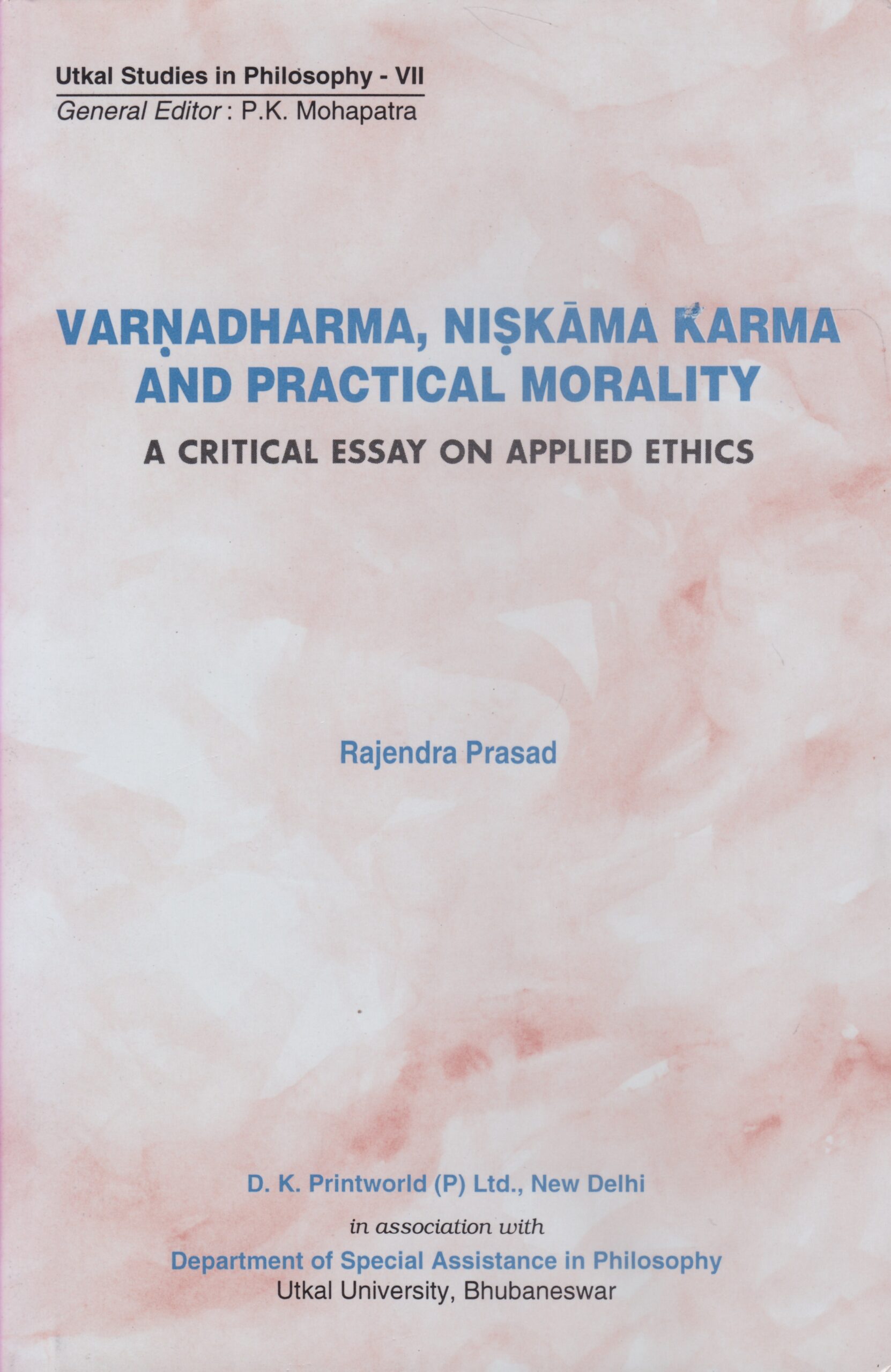
This work analyses some basic concepts of Indian ethics. It shows that a Varnadharma cannot be both natural and obligatory, the prescription of acting desirelessly makes any desireless action justified, the jivan-mukti concept is inapplicable, etc.
This book provides a bold, original and ciritical analysis of some basic concepts of Indian ethics, lifting them up from their regional roots to a general philosophical level, along with illuminatingly creative analysis of some practical issues of moral living. Professor Prasad shows, on logical grounds that a varnadharma cannot be both natural and obligatory, the prescription of acting desirelessly makes any desireless action justified, acting desirelessly itself cannot be a duty, the concept of jivanmukti is inapplicable, etc. In respect of ethical practice, he argues, with fair amount of rigour and originality, for moral anger and forgiveness as a conditional virtue, basing secularism on the primacy of the ethical, and preferring a morally good professional to one who is good as a professional or as a person. His plea for legitimacy of profit in business and non-hyperactivism in applying ethics throws useful light on business ethics. His down-to-the-earth approach makes the book a work on applied ethics and his conceptual openness makes it one on the basics. Its simple style makes it useful not only for students and teachers of philosophy but also for general readers with interest in Indian philosophy and culture.
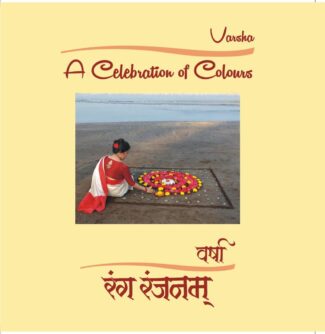
This volume, through colours, transcends many a cue of the aesthetic aspects of human life into a connoisseur’s mind. Whether on fabric or canvas, mud wall or floor, sculptures or pots, colours for us is a language, a raga and a tala.
Colours are not just for adornment, but a medium that reflects our state of mind, artistic acumen, culture, ethics, philosophy, social values, tradition and the sacredness of life. A non-verbal language, they conjure up our emotions, feelings and moo ds, and take a rasika far beyond the realms of words. In them we see the lush and luxuriant natural world around us, the world of birds and blossoms, earth and sky, gems and stones, creating in us a certain feeling and a gush of powerful ethos.
The artist in Varsha, through colours, transcends many a cue of the aesthetic aspects of human life into a connoisseurs mind. Whether on fabric or canvas, mud wall or floor, sculptures or pots, colours for us is a language, a raga and a tala. And Celebration of Colours is just that.
Involved with her family, Varsha loves art and craft, whether it is painting, embroidery, working with terracotta and ceramic, jewels and the creation of ornaments, crochet and knitting, stitching and designing clothes, or cooking. Absorbed in the world of colour, she likes to share her moment of beauty with everyone around her and spread joy everywhere.
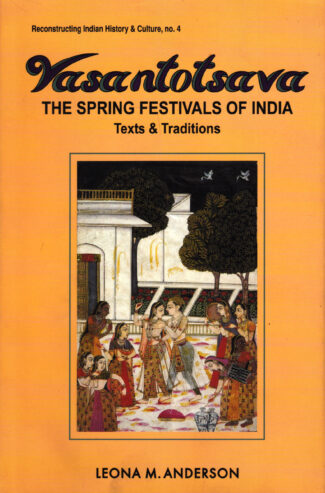
This study treats Vasantotsava as a thematically unified generic whole embracing a range of spring festivals, pansectarian in character and incorporating various rituals. It reassesses Sanskrit texts to explore the rituals, symbols and underlying motifs of the Vasantotsava.
This study treats Vasantotsava as a thematically unified generic whole embracing a wide range of spring festivals including the Phalgunotsava, Caitrotsava, Phalgu, Madhutsava, Madanamahotsava, Madanatroydashi, Anangotsava, Madanadvadaishi, Kamotsava, Shripancami, Yatramahotsava, and Holaka (Holi). These festivals are pansectarian in character and incorporate a variety of ritual observances practised through- out the Indian subcontinent. Signifying the termination of winter and announcing the advent of spring, the celebration was a diverse and complex spectacle situated within the framework of Indian ritual and myth. On the basis of puranic and ritual texts, folk tales, drama, poetry, and narratives in mixed prose and poetry (campus), Dr. Anderson addresses complex issues of indigenous ritual, mythology, and tradition. The Vasantotsava incorporates a broad spectrum of human concerns: in the sphere of polity, it can be turned to account to celebrate and reinforce the power of the king; in the social sphere, it is a time of revelry and merry-making indicative of the annual renewal in human affairs; and in the sphere of religion, it celebrates the exploits of the gods and establishes a link between human and divine actions and events.
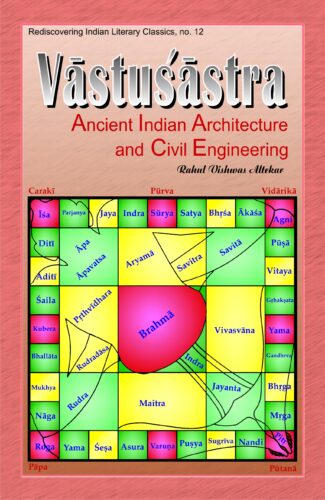
Examining vàstu÷àstra’s conceptual roots in øilpa÷àstra and its later evolution, the volume analyses technical aspects of vàstu÷àstra by concentrating on the essential elements (aïgas) of vàstu÷àstra which involve decision-making and actual construction methods, art of engineering and role and responsibilities of engineers, and aspects related to land materials and rituals associated with use of building after its construction
Though there has been considerable interest in vastushastra in recent times and the orientational aspects of vastushastra have been often discussed, little is known of the essential elements that constitute This small book, written in a simple and lucid style, contains teachings of great men, gleanings from the scriptures, and examples from the epics and Puranas, and suggests easy solutions to the various problems faced by man in the present-day world of violence, wars, killings and disasters, and how to have a holistic approach to life vastushastra and its scientific application in the present day. Based on extensive research, the work, vastushastra attempts to address this aspect. Examining comprehensively the subject of vastushastra: its conceptual roots in Shilpashastra and its later evolution as dealt with in the Vedas, the Epic literature, Arthashastra, literature on ayurveda and Kamasutra literature, the volume analyses technical aspects of vastushastra by concentrating on the essential elements [angas] of vastushastra which involve decision-making and actual construction methods, art of engineering and role and responsibilities of engineers, and aspects related to land materials and rituals associated with use of building after its construction. It discusses the eco-friendly life style of the ancient Indians based on vastushastra principles. Giving minute attention to details, it focuses on the application of vastushastra in the present-day society — how the vastushastra principles can be scientifically applied and the potential of application of vastushastra keeping in view modern trends in architectural science and civil engineering.
The book will be useful for students and scholars of architecture and engineering and those interested in vastushastra.
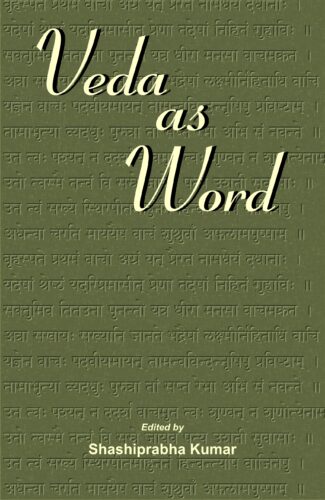
The present volume is a collection of papers originally presented at the first National Seminar held at the Special Centre for Sanskrit Studies, JNU, New Delhi, in February, 2005 on Veda as Word. The book covers Vedic philosophy, phonetics, ritual, accentology, mantravij¤àna, exegesis, narratives, lexicography, etymology, grammar, ethics, epistemology and some vedic hymns which deal specifically with word or sound.
The present volume is a collection of papers originally presented at the first National Seminar held at the Special Centre for Sanskrit Studies, JNU, New Delhi, during 11-13 February, 2005 on Veda as Word. The book covers in its gamut Vedic philosophy, phonetics, ritual, accentology, mantravijnana, exegesis, narratives, lexicography, etymology, grammar, ethics, epistemology and also some select hymns of the Veda which deal specifically with word or sound.
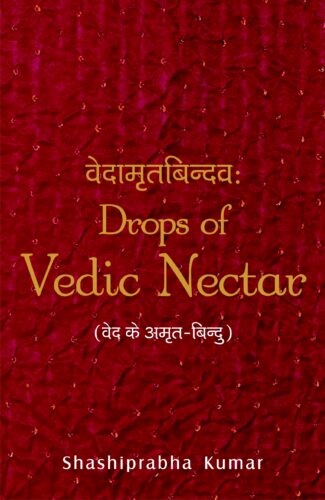
Vedamritabindavah (Drops of Vedic Nectar) is a modest tribute to those who are genuinely interested in Vedas universal message. It is a collection of select Vedic statements with Hindi and English translations intending to communicate the Vedic wisdom to the young people of modern age. This book, with fairly accurate translations from Vedic Sanskrit, aims to acquaint the modern readers with their most ancient, richest literary heritage so that they can comprehend its worth and bring value to their life.
In spite of numerous translations available, this volume has some novelty in its content and freshness in its presentation, and stands witness to the fact that in representing Vedas, there still exist infinite possibilities.
Vedamritabindavah (Drops of Vedic Nectar) is a modest tribute to those who are genuinely interested in Vedas universal message. It is a collection of select Vedic statements with Hindi and English translations intending to communicate the Vedic wisdom to the young people of modern age. This book, with fairly accurate translations from Vedic Sanskrit, aims to acquaint the modern readers with their most ancient, richest literary heritage so that they can comprehend its worth and bring value to their life.
In spite of numerous translations available, this volume has some novelty in its content and freshness in its presentation, and stands witness to the fact that in representing Vedas, there still exist infinite possibilities.

All the philosophers of Vedànta have resorted to reason in their attempts to reconcile the reality of Brahman with that of the world of empirical experience. This book traces the philosophical development of Vedànta starting from Badaràyaõa to Sri Aurobindo and critically evaluates their arguments and positions.
The problem of reconciliation of mutually incompatible Upanishadic statements on some of the basic problems has attracted the attention of almost all the major philosophers of Vedanta. One such problem is about the nature of relationship between Brahman and the world of empirical experience. And in their attempts to reconcile the reality of Brahman with that of the world of empirical experience almost all the philosophers of Vedanta have resorted to reason. They have not only tried to provide rational justification for their positions and views but have also used reason freely in analyzing and criticizing the rival positions and views. In this process several arguments which are subtle and cogent are developed. However, some of the Vedantins who have shown critical spirit and acumen in understanding and criticizing the rival arguments and positions are not so critical about their own arguments and positions. Thus the Vedantins who came after Shankara have made his position (advaita) their major purvapaksha without, however, trying to make their own positions a possible purvapaksha. This is an attempt to trace the philosophical development of Vedanta starting from Badarayana to Sri Aurobindo, and to understand and evaluate critically their arguments and positions.
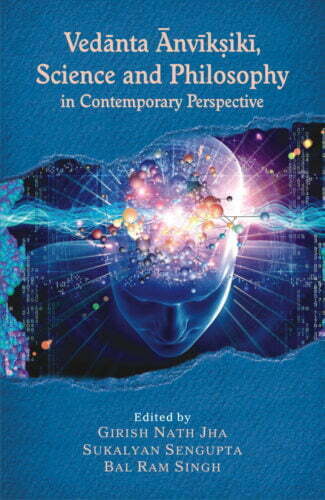
This volume features thirty-one well-researched articles and resonates the current expectations from Vedanta in a fast-changing world. It discusses and debates among reputed and erudite scholars the Vedantic traditions and their scientific and contemporary relevance to the society across the globe.
Ancient Indian thought system, well known for its relentless argumentation on varied contentious issues, paved the way for maturing deep philosophical thoughts, and scientific and technological inventions. This volume Vedanta Anvikshiki, Science and Philosophy in Contemporary Perspective, which resonates the current expectations from Vedanta in a fast-changing world, is the proceedings of the 21st edition of International Congress of Vedanta organized by the Center of Indic Studies, University of Massachusetts, Dartmouth during 11-13 July 2013.
The volume presents thirty-one research papers from reputed scholars on wide-ranging topics like metaphysics, knowledge and hermeneutics, science and technology in ancient texts, interpretation of key texts, digital libraries, yoga and ayurveda, spirituality and science, interfaith dialogue, Indian cosmology and psychology, Vedantic pedagogy, history, culture, social systems, corporate world, governance, music and consciousness studies. These papers present vast treasures of Indias knowledge systems and offer potential for multidisciplinary research.
It would be of immense value to the students and scholars of Vedanta, and would stimulate them for more discussions and debates on Vedantic traditions and their contemporary relevance.
Vedanta for the Western World is a collection of sixty-eight articles appeared in a magazine having the same title during 1938-45 by eminent scholars of international repute such as Aldous Huxley, Allan Hunter, Gerald Heard and Swami Prabhavananda reflecting on the varied aspects and universal reflections of Vedanta, with an Introduction by Christopher Isherwood. Vedanta, the Vedic philosophy per se, and not time-specific, focuses on three fundamental propositions that man’s real nature is divine; aim of human life is to realize this divine nature; and all religions are essentially in agreement as far as this divine concept is concerned. The essays featured in this volume imbibe and exude the same philosophy being best suited to the understanding of new generation audience, especially the one that belongs to the Western world. This unique volume stands out in its genera of works due to a wide gamut of topics featured in it under the umbrella banner Vedanta. It enables every student of Vedanta know the essence of the Vedic philosophies from the perspectives of both Indian and Western scholars and men of merit.
| There are no products |